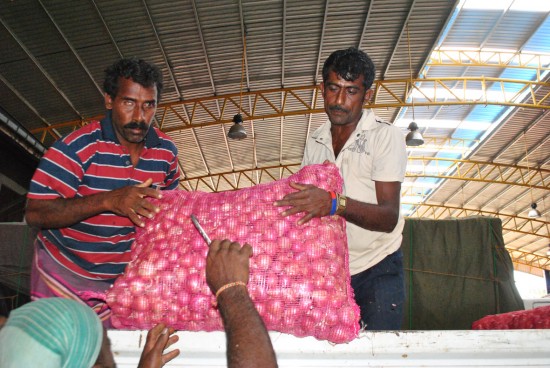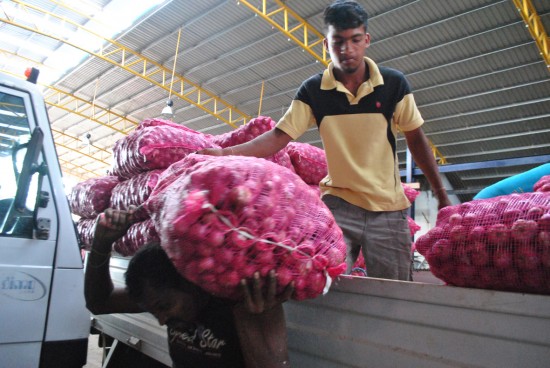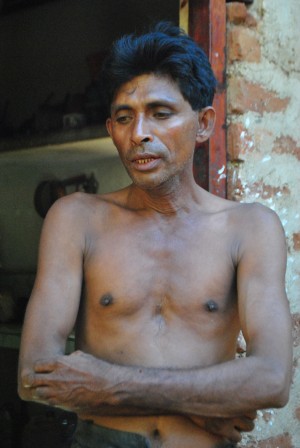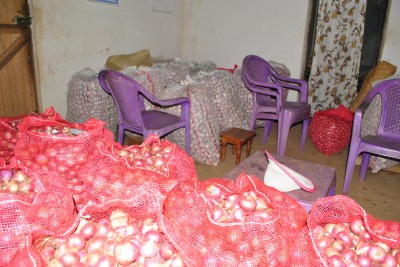Onion farmers on verge of suicide as government plays havoc with the trade
Reporting from Inamaluwa, Dambulla
Onion farmers in Dambulla have no other option but to commit suicide as they are forced to sell
their crops at a loss
Farmers say they have to sell a kilogram of Big onions at Rs.32 while it costs them Rs40 to produce.
In an economic climate that has hit all farmers across the nation these onion growers told Lanka Standard that they saw no light at the end of the tunnel.
Three years after the war ended residents in Dambulla like elsewhere in the island were looking
forward to a better and brighter future. Not so say many of them who have been hit hard by the soaring cost of living and lack of opportunity to better themselves.
“Committing suicide would be the ultimate solution to get away from our debts,” said one and others agreed.
“Whatever the little jewelry we had, have been pawned and we are not in a position to get them back. We are in debt all over. The only option is to commit suicide,” said a group of dejected onion farmers from Inamaluwa
While accusing the government of not introducing a mechanism to purchase their harvest even at cost, they also said the government continued to import onions when they should cease importation well ahead of the local harvest. The farmers accused the government of being more concerned with the interests of the big onion importers and merchants who are their close associates rather than that of the farmers who actually contribute to a stable economy.
Import tax
“The government says that the import tax has been increased by 70% now. What is the use of increasing the import tax when they have failed to secure us from the imported onion? Unless onion importation is restricted three months before the Yala crop is ready, we will have to face this pitiable situation continuously. If the
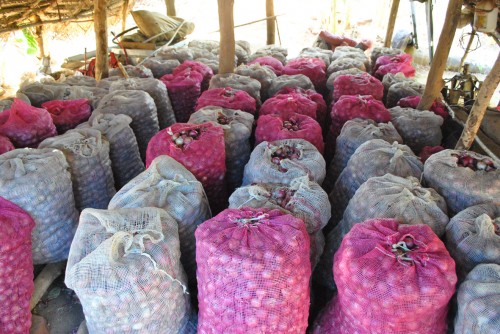
Unsold bags of onions rot in a temporary shed at Raja’s modest residence consisting of a small wattle and daub hut
import restrictions are implemented in a proper way, we will be able to get a better price for our produce and hard work,” said Raja one onion farmer we spoke to.
Meanwhile farmers in Inamaluwa and Dambulla also blamed Matale District Parliamentarian, Land and Lands Development Minister Janaka Bandara Tennakoon for the catastrophe since
he has not intervened to give them any relief although many promises have been made as usual during election time.
“He promised us a good price for our onions but has never kept his pledge nor paid a visit to us to listen to our grievances. We were not bothered about these promises in previous years since we got a good price for the crop. All attempts to get an audience with him to talk about the problems faced by the onion farmers are in vain,” said Raja.
Minister says farmers are helped
However, Cooperative and Internal Trade Minister Johnston Fernando when contacted by this
website said that Sathosa outlets purchase 16 tons of onions per day although its sale was much less.
“Although Sathosa purchases 16 tons of onions every day, their island wide sale is not more than 6-7 tons per day. Since we pay a higher price to the farmer we also have had to sell the onions keeping a small profit. However because onions are sold for a lesser price in the open
market, Sathosa sales have gone down considerably. Nonetheless we still continue the purchasing process to help the farmers,” said Fernando.
According to Fernando, steps have been taken to help the farmers to build drying huts to stock their harvest till they are dry enough to send to the market.
“Under the direction of President Mahinda Rajapaksa we will help the onion farmers to build their own drying huts from next season. Once the onions are harvested, they will not need to rush them to the market but could stack them inside the drying huts. Once the onions are dried properly, the farmers could release them to the market for a better price,” said Fernando.
Rotting raw onions
He further accused the farmers of bringing ‘raw’ onions straight from the fields to the market.
“In order to earn a lot of money these farmers bring ‘raw’ onions to the market. These onions cannot be kept even for two weeks,” said Fernando.
However the onion farmers in Inamaluwa, Sigiriya, Dambulla and Galewela are in a dire state as for them there is no other option but to sell their crop for Rs.32 a kilogram at the Dambulla Economic Center.
“Other than the initial production cost, for each kilogram we have to give two rupees as commission to the trader. We have to buy the red nylon sacks for Rs.22 each to pack the onions. However when the bag is given to the trader with the onions they pay us only Rs.10 for the nylon sack which is a loss to us. Other than the production cost, because of these additional costs we have to bear, we are now helpless as we are sunk in debt,” explained Sunimal.
Sunimal has cultivated onions in two and a half acres of land but added that he is now depressed because he was not able to sell his harvest for a good price.
“I took part of the harvest to Sathosa and Dambulla Economic Center two weeks ago. Sathosa was not ready to purchase onions due to lack of storage facilities while Dambulla traders want the onions for a pittance. I had to bring back the stock once again spending Rs.4, 000 for transportation,” said Sunimal.
Meanwhile Raja said that he had spent nearly Rs.2 lakhs this season, for his onion cultivation in one acre of land.
“From all this hard work I was lucky enough to get 5,000 – 5,500 kg of onions. If I sell at Rs.32 per kg I would not even be able to recover the production costs leaving any profit aside,” Raja said.
Kerosene prices sky high
According to Raja, the kerosene price hike early this year was one of the main factors for high production cost. Unlike in previous years the kerosene prices skyrocketed but we were not given any subsidy. Since the canals and water ways have gone dry, we had to dig temporary wells to irrigate the cultivation. This cost me around Rs.18, 000. Then I had to stay awake every night to chase away the elephants that come to the village. After facing all these obstacles, without proper sleep or food how could we survive by selling the onions for a pittance? I will be unable to settle my debts but also will not be able to get the gold jewelry released from the bank. I have to find Rs.1 ½ lakhs to save the jewelry,” said Raja.
Abeykoon and Jeyakumar were unloading their onion stocks at Dambulla Economic Center when we met them. They have brought their crop from Galenbindunuwewa and Kiulegala.
“Last year we had to pay Rs.67 for a litre of kerosene oil and this year it is Rs.112 or Rs.115 per litre. It is difficult for us to continue in onion cultivation as we are in debt all over and the government does not give us any subsidy nor do they have any plan to introduce a mechanism to give us a good price for onions,” said Abeykoon.
For these farmers who are merely trying to survive it is indeed a hard life. Jeyakumar is incredulous as to how the purchasing prices have fallen so much lower than the production costs.
Thinking of his family and his home he told us, “there is no other option but to sell the harvest even for a lesser amount so that I can have my house deed released from Mudalali.”
Meanwhile Bandula Premathilaka who has cultivated onions on a three acre land was lamenting as how to settle the debts.
“I will take the onions to the Dambulla town and throw them on streets as to how the milk farmers did a few months ago. There are sacks of onions all over my house and the temporary shed. What can we do with such a large stock? If I cannot sell the onions at least at cost, I will die setting fire to my body. I cannot face the mudalali for failing to pay back the loans and my wife for not getting her chain and the ring back from the bank,” Bandula said.
He further accused sathosa for not purchasing their products.
“When I went to meet the Purchasing Officer, I was told that they cannot purchase the onions as they do not have storage facilities. If so why did the government announced that farmers can sell their crop to sathosa. Now they wanted us to come to sathosa on Thursday October 4, to take token numbers.
Middlemen all the way for the government
“For this we have to walk more than 2km early morning if we are to get the first few numbers. They only purchase 15, 000kg a day and only 2, 000 kg from one family. Only seven families would be able to sell 2, 000kg each per day. There are more than 200 families in this village and how long will it take for them to sell the crop? In some places we were told that Sathosa does not buy onions from farmers but only from the traders who buy the onions from the farmers for a small price and sell to Sathosa for a higher price. It is also alleged that in certain areas, Sathosa purchases the onions from the traders not from the farmers. Why this double standard? Was it to get a ‘cut’ from the traders,” alleged Bandula.
Meanwhile Priyanka and Ajitha, two female farmers described as to how difficult it is to sell their harvest even at cost.
Onion farmers threaten to turn tobacco growers
“Why do we want to spend lots of money for onion cultivation and later get heartaches for not being able to get a good price for our hard work? All the farmers in Inamaluwa have now decided to grow tobacco from the next harvest. This is profitable. We only have to work hard and all expenses are borne by the ‘dumkola mudalali’ (tobacco merchant). Whether the leaf is big or small they are bought for a fixed price –Rs.22 per kg. Even the fertilizer is provided; money is given for kerosene oil to pump water and labour charges to harvest the crop are also borne by the mudalali. We would like to see as to what the government is going to do when the onion farmers switch to tobacco farming from next season,” said Priyanka.
Meanwhile Ajitha said that her husband has gone in search of labour work to settle the wages they owe to the people.
“The villages come for daily work in our fields to reap the crop. Although we promised them to pay the money once the onions are sold, still we could not keep the promise. That is why my husband is going to do some odd jobs to earn some money to settle the bills.
Lakshman who had also come to the Dambulla Economic Center to sell his harvest even for Rs32 as there was no other option for him told us his story.
“I had to pay the lorry Rs.70 per bag of 46 kg. Since I have bought five barrels of kerosene oil on loan, I have to give 100 sacks of 46kg onion for the mudalali. I had to pay Rs.60, 000 to harvest the crop. So what else is there remaining for us? Even I have kept my bicycle and the house deed with mudalali. In the event I fail to pay the money back I will lose all my earthly possessions,” he said.
